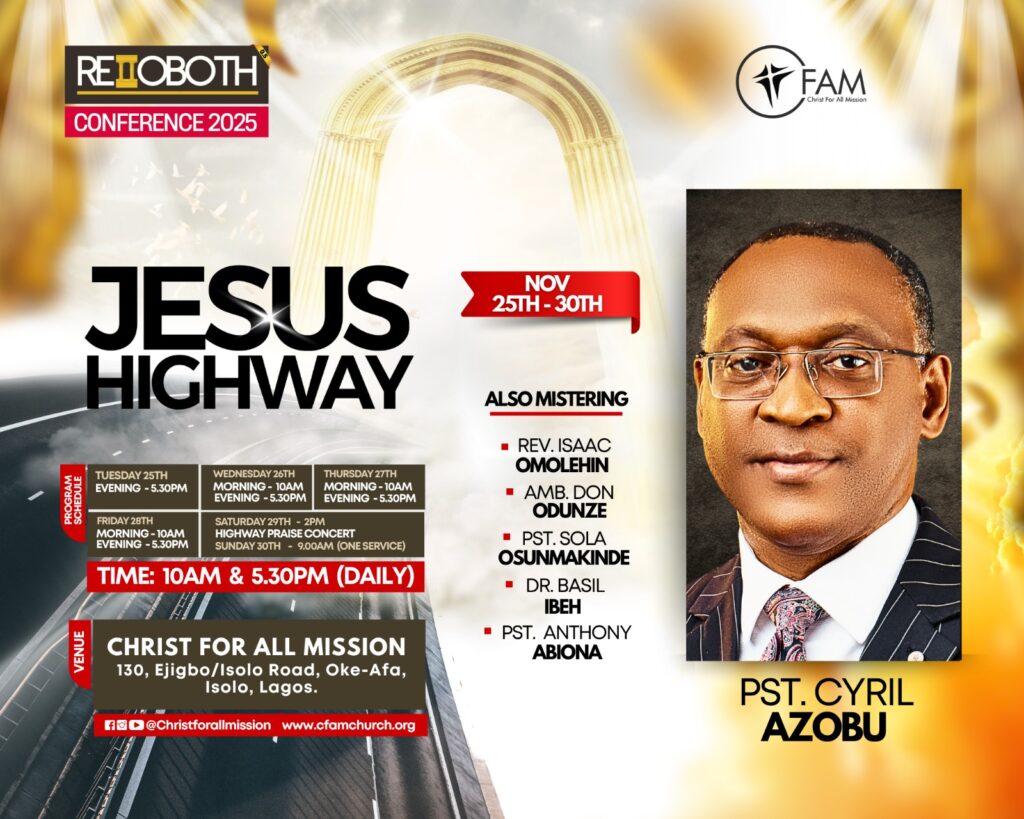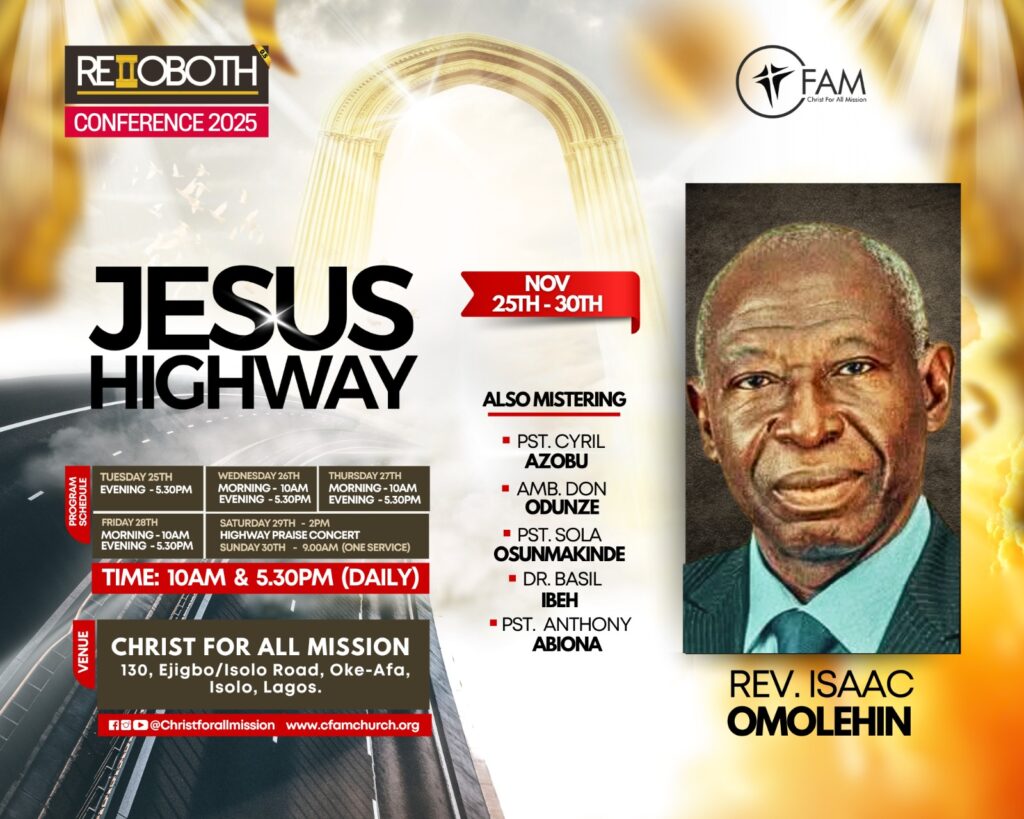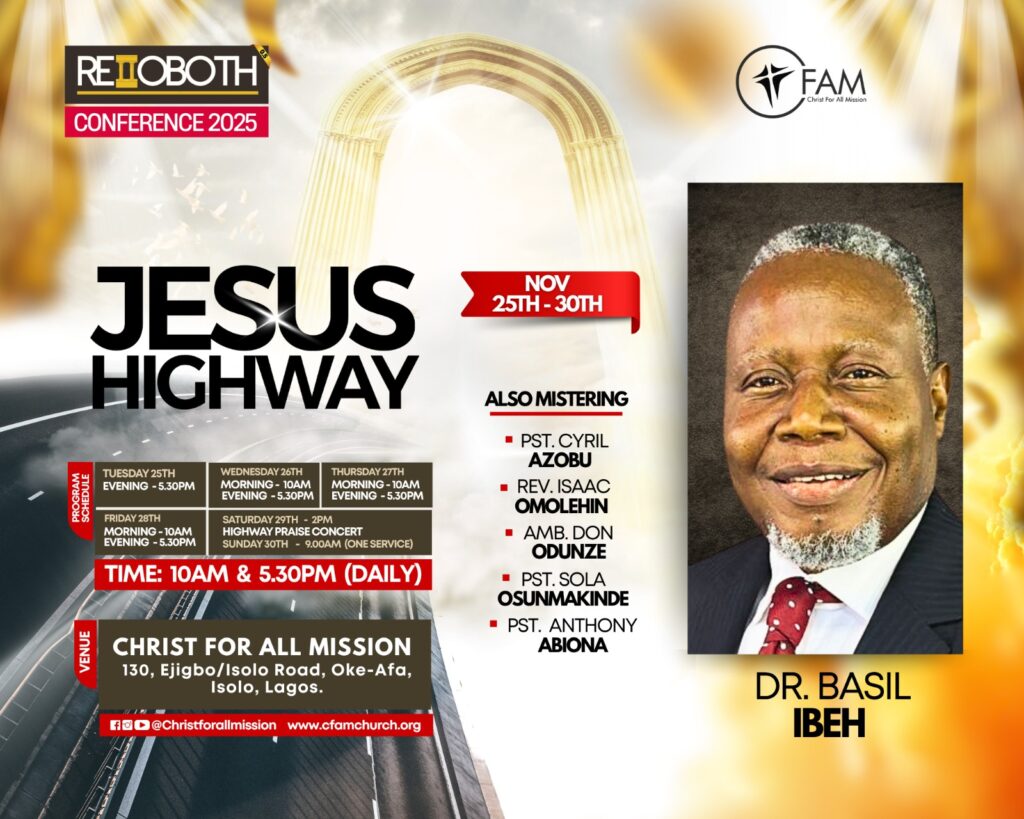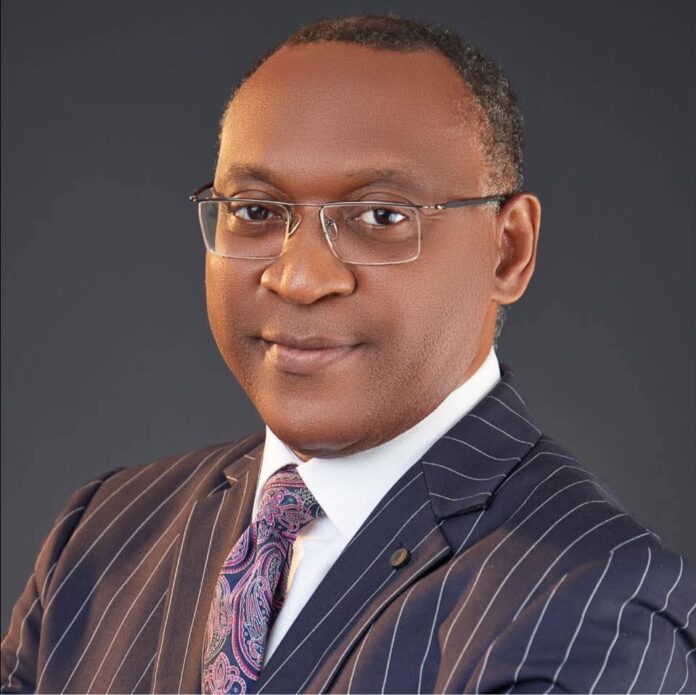Rev. Cyril Azobu, Lead Pastor, Christ for All Mission (CFAM), Oke-Afa, Isolo, Lagos, explains the importance of strategic and intentional discipleship in this interview with Christian Benefits on the forthcoming Rehoboth Conference 2025 of the church. He shares with fellow church leaders CFAM’s strategic discipleship model, which he says, is aimed at raising seasoned disciples, faith-rooted believers and conveyors of the nature of Christ. He also discloses the expectations from this year’s Rehoboth conference of the church. Excerpts.
What is the vision upon which Christ for All Mission (CFAM) was birthed 44 years ago?
First, I gave my life to Jesus Christ in 1986; five years after the church was founded. The original vision was understood as a ‘mission-based church’ focused on reaching the world for Christ and winning souls in preparation for His return. The objectives, including reaching communities and preaching God’s word, were clearly defined in the church’s constitution. Under the present leadership, the primary vision has been refined and embedded within the broader mandate of the believers in Christ.
Does this church still run with this soul-winning vision under your leadership?
Our vision remains soul winning but taken further to strategic and intentional discipleship. The mission is now explicitly defined as ‘reaching the world for Christ, raising seasoned disciples and releasing them for the kingdom service. Merely winning soul for Christ’s return is insufficient. Christ commanded us to go and make disciples of all nations. The ‘releasing’ aspect was previously lacking in the church, leading to stunted growth as individuals were not intentionally guided to discover and fulfill their purposes and callings.
What more does the church now do differently under your leadership?
The church is now adopting a more intentional and organic approach to raising seasoned disciples. This means cultivating individuals who are not only deeply rooted in their faith but also impactful in their respective spheres of influence, for instance acting as ‘apostles in the marketplace.’ These disciples are expected to represent Christ and His values, like integrity and righteousness, in all aspects of society, drawing a parallel to figures like Daniel who influenced governmental settings. A deliberate discipleship process has been implemented, incorporating teaching and interactive learning. A key program is the ‘School of Discipleship and Ministry,’ which we began online during COVID, initially for leaders, and is now being expanded to a broader audience. Since I took over, what’s big in my spirit is raising disciples and season them that we are not just rewarded, but that people who are seasoned in such a way that where Christ has sent us we will be relevant. We are raising disciples who are seasoned for God, and who are able to stand for Christ without compromising. In the past the church focused little on discipleship but not strategic and intentional. But now the church is intentional in raising seasoned disciples. We now have a deliberate disciplining process by teaching and interaction. Most of the new people God is sending to us now are not the already saved people. Acts 2 says God added to the church such as He should. It’s not those people who are already saved but those who are coming with different appearances. The way they see God is different. God is saying to us “I am sending these people (the unsaved) intentionally to you. They are mostly the Gen Zs who have their way of thinking.

You are a top notch corporate player in the Nigeria’s mining sector. How does this impact on the growth, expansion and progress of Christ for All Mission?
I just talked about apostles in the market place. I’m not just a church person but also someone who found himself in the market place. I’m known in the market place as one who is of God. I lift up the name of Christ and talk about the ministry (CFAM) everywhere I go. In my office you will see things about God. My work is representing what God wants us to be. It’s not just being religious in the market place but being someone who does what God wants. There’s no need to ask where the integrity of people who are righteous is? I pattern myself after the life of Christ.
How do you bridge the gap between the foundational or the old members of the church and the new members, particularly the so-called Gen Z?
We have deliberate plans for both the older and the new or the younger members of the church, including the so-called the Gen Z. The new ones and the youngers one look at things differently with a different approach. This is one reason I scarcely spend much time with the older ones. Most times when I ask the younger ones who invited them to the church, they would say they came by themselves and liked the church. It’s just that they are not genuinely saved. The only way to disciple them effectively is to guide them, understand where they are coming from, introduce Christ to them and let them see Jesus for who he is. Let them understand the power of God. As you walk patiently with them they will find themselves and start pushing for the fundamentals. There is a lot of inward transformation that will then reflect outwardly. We have some of them that do not want to come to church following orders. The truth is Jesus says allow them the way they are. In an attempt to keep the status quo, you may want to uproot. When you are uprooting you may uproot the good ones as well. So, allow them to grow. The church is a place where people come and they should see a change in their lives and in the way they live. We did a survey for 2030 when I took over in 2020. We started with vision 2025 which ends this year. Now, we are launching vision 2030 which is a continuum of what people see now. We have people who were formerly cultists. Some of them have been in the church for a while now and are on fire for the Lord today. One of them gave a testimony that he was formerly the Capone of a cult group, but now he’s one of the pillars driving the youths.
What will you adduce as reasons why people jump from church to church today?
There’s a mix of many reasons. One is that many of the people jumping from church to church were not intentionally discipled in their previous churches. Churches must be intentional about discipleship. They must be clear and intentional in anchoring their discipleship classes. If the set man is not living it or role modeling it (Christ’s nature) people will keep jumping from his church to other churches. As a pastor or church leader you need to propel it (discipleship) with an apostolic mindset. Here (CFAM) we raise seasoned disciples and send them out. It’s a disciplining process. When Jesus released the apostles he gave them a mandate to go and make disciple of all nations. If the apostles didn’t know what it means to disciple, they wouldn’t have the mindset of discipleship. They wouldn’t understand the role of their calling. Discipleship is not about church building. Discipleship is a model of raising believers. God did not call me to be a helper but to raise disciples that will be representatives of Christ; people that will stand for godly things wherever they are. Whether they are in education, business or in whatever sector they are, they will stand for God as His representatives and ambassadors of righteous living.
Does CFAM have a projection of building a massive cathedral like some churches today in memory of its late founder ?
There’s a difference between focusing on institutions and focusing on the people; institutions as in building structures. It’s the people that build institutions; not vice versa. If you are focusing on having a name and fame, the church people will ride on your name and fame. The day you are gone, the church is also gone. CFAM is alive today because we are raising genuine and generational disciples. I’m here today as the successor of the church’s founder, late Bishop Ike, because the church raised me in a way that it will continue to flourish. We call ourselves the Abraham generation; moving from Abraham to Isaac to Jacob. True sons or successors emerge from among those you raised.

What is the significance of the church’s forthcoming Rehoboth Conference 2025?
Our late bishop and founder of the church Rev. Ike laid a solid foundation. We have moved from that solid foundation to expansion where we had laboured like Isaac in Gen 26 and expanded.As a church, this is our expansion season; not only in structures but also in people who are discipled. Structure is good but the focus is people. When Jesus talked about the church, he’s talking about people. We focus on raising people as believers. It’s when the people expand you then realize that the place is too small and you can now tell Elisha that the place is too small. When you build the people, you build the church. Most of the solid people we have in our church today were the harvests of the church’s yearly Rehoboth conference. Some of the transitions in the church are results of our yearly Rehoboth conference.
What should people expect from this year’s Rehoboth Conference?
When you are coming to this year’s Rehoboth conference, don’t think small but big. People should expect impactful and transformational word of God from some seasoned servants of God for positive impact on their lives. God is telling us He is positioning the CFAM as a reference point where people can come to learn. We are enjoying visibility. I tell people that we shouldn’t reduce the standard. Every year we keep raising the bar in terms of excellence, input, output and impact. The yearly convention closes at the end of November with our annual thanksgiving. It creates the strategy for expectation in the next year. We use it to build a long lasting experiences. It’s a time to reflect and know what the Lord is saying. We look up to Rehoboth; knowing that God is looking to us too as a church.
Share with us some of the lasting experiences of last year’s Rehoboth Conference 2024
At last year’s Rehoboth Conference 2024 we had an overflow of participants such that we placed a large screen outside the church auditorium for the overwhelming huge participants outside to view and follow the programme. We had a watch night service. Sometimes, we do things out of faith, not knowing how God is going to do it. Thirty six new people gave their lives to Jesus Christ at the watch night service. We see beyond the programme; looking at the impacts and the testimonies. Rehoboth is like a catalyst. The catalytic moves make the expectations for the next year. We always want to beat the previous year; doing something bigger and better.
Aside the yearly Rehoboth conference what are other major annual programmes of the church?
We have retreats twice a year. The retreats are not about people coming from different places. They are transformational moments in God’s presence. This year 2025 we organized Easter outreach at which we gave free medical aids. free medical checkup and free clothing wears to a huge number of people. We have medical professionals in our church, who with their friends, rendered free medical aids and support to a large number of people. We create experiences that position us (CFAM) as a reference point for Christ. We have testimonies of our social relevance and impact to the people in our church community.
How will you describe God’s move at CFAM so far this outgoing year 2025?
God has been very wonderful and faithful to us. We have several testimonies of lives, homes and businesses that have been transformed in our church this year 2025. Every month we have a prophetic declaration where God speaks to specific people and to us as a church. We have seen our youth evolved big time! Transformation of our men moving into ministry is amazing. They are not just coming to church but because we are seeing transformations. It’s one of the things I’m most grateful about to God. When I stop hearing from God, I drop. What keeps me running is hearing His voice. Moving to the end of the year into another year, I pray to know Him more. I’m very grateful. People are conscious of the fact that God is here; they say they never knew God this way.



